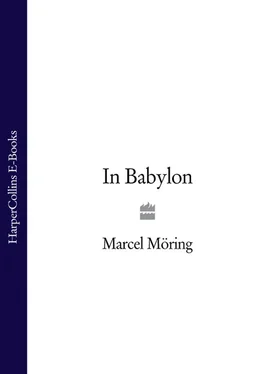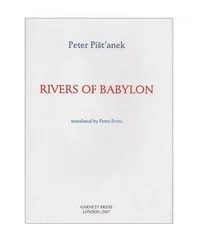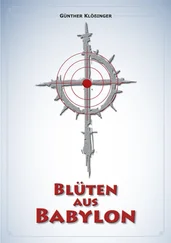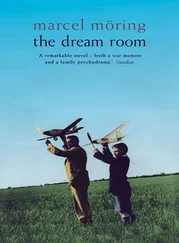1 ...6 7 8 10 11 12 ...24 ‘Wow …’ A glittering flickered in her eyes. ‘What a shame I wasn’t there.’
‘Yes. You don’t know what you missed.’
It had been quite spectacular. Under any other circumstances, if I hadn’t been so cold and it had been of my own free will, I’d probably even have enjoyed it.
After I had abandoned my hunt for Nina, I’d staggered up the stairs like a wounded deer and immediately begun throwing things down. Fire. The word blazed before my eyes. I grabbed chairs, seizing them by the legs and hurling them to the ground. One of them smashed to pieces on the stone floor of the hall, another bounded up and down a few times like a young stag on mahogany hooves, and then broke. It was followed by a hatstand, a stool and the drawers from a sideboard.
The sideboard was the first piece of furniture blocking the way upstairs, a sturdy oblong, four drawers high, old oak, wrought brass handles. I knew nothing about antiques, but it looked Dutch, early nineteenth century. On top of the sideboard was a small red sofa, covered in plush right down to its squat wooden legs. On the seat were marks left by the chairs I had already hurled into the depths. Various odds and ends were scattered over seats and tabletops: a pendulum clock, a pile of framed photographs (Uncle Herman and Enrico Fermi, our family on board the ship to America, Sophie, Molly, my first wife). To the left of the sideboard my way was barred by a secretaire, and above that, a wooden colonial-style desk chair with padded green leather seat. The space on the right was completely filled by a mahogany china cabinet, taller than I was, the colour and gleam of fresh dung. I lifted up the desk chair and flung it over the banister. For a brief moment it occurred to me that I was standing here before a collection of antiques which had not only been assembled with great care, but which was also quite valuable, and that I had judged this construction of chairs, cupboards and knick-knacks on its wood content alone.
It had taken me a while to decide what to do next. The barricade was as much of a puzzle as it was an obstruction. If I removed the sofa, I’d have access to the linen cupboard, I could bash in the doors and side panel and dismantle the rest. Then I could cut through the ropes and the piano would go crashing down without hurting anyone. I reached forward, grabbed one of the sofa legs and tugged carefully. The sideboard under the sofa groaned. When I looked up at the piano, slow patches of light were gliding across the gleaming black lacquer and the sideboard began to move. The piano needed the sideboard to stay up, the sideboard needed the sofa to hold it down.
I walked downstairs to gather up the bits and pieces of wood, carried them into the kitchen, lit a fire in the Aga, and went outside.
It was snowing harder than ever. I had to grope my way to the gardener’s shed. There, tired and wet and cold, I rummaged through the tools. I chose a rake, a hoe and a shovel, cranked up the grindstone and placed the blade of the hoe against the grinding face. Minutes later it was sharp as a knife. I threw a hammer, a chisel, a pair of pincers, and a couple of screwdrivers into a burlap sack, tucked the tools I had set aside under my arm, and walked back.
Lucky for me, the shed was only about a hundred feet away from the kitchen door and I wasn’t so tired that I’d lost my sense of direction, but even at this short distance, anyone else would have been in serious trouble. The icy wind whipped up thick whorls of snow and drove the flakes in high banks against the back of the house. If it continued snowing like this, in a few hours’ time I’d no longer be able to get the doors open on this side. I’d have to climb out the window to dig a passageway through a bank. From what I could tell, the snow was about two feet deep, much deeper in places where the wind had blown drifts. That shovel would certainly come in handy.
Back inside, at the top of the stairs, I climbed up onto the sideboard and the sofa. I straightened up and, balancing precariously, raised the hoe. Night hadn’t fallen yet, but dusk hung heavy in the hall and I could barely see the ropes. It was a long time before I finally got the blade in the right place. If I cut through the left rope, the one farthest away from me, the right side of the piano would come down. The piano would land next to me on the stairs or, by the force of its own weight, tighten the rope around the left side and hang there, at least for a while. Then I could cut through the remaining rope and let the piano fall on the stairs. I pushed the hoe upward and began to make cutting movements. The blade was so sharp, it sliced through the rope in almost a single stroke. There was a loud bang, the creaking of wood, the groaning of the rope as it was pulled tighter. But the piano didn’t just hang there. It swung forcefully to the right, seemed to come to a standstill, and then, with a powerful heave, came swooping back. It was a terrifying sight, the great gleaming black instrument swinging back and forth up there from the ceiling. The rope groaned loudly and you could faintly hear the singing of the piano strings. Then the barricade began to move. The sideboard shifted. Wood moaned, slid past more wood and made the disagreeable sound of things being slowly pulled apart. I aimed my hoe at the other rope, which was quivering with the strain, and pressed down. The rope was hard as steel. I took a deep breath and leaned my weight against the handle. Suddenly, before I knew what was happening, a black beast came raging down from the heavens. I fell sideways, grabbed hold of the sofa, which began tipping, and let go of the hoe. The roar of breaking wood, a crash as if a complete symphony orchestra had been hurled into a cellar. The whole house was filled with sound, piano notes echoed from wall to wall, pieces of wood that had flown up came back down again.
It was a full minute before the rustle of silence had taken possession of the hall once more. Down below, the stone floor looked like the scene of a shipwreck on a South Sea island beach. The piano had exploded in a cloud of brushwood. Only the harp and lid had survived the fall. The rest lay strewn over the marble tiles in chunks the size of a hand or a forearm. I grabbed the rake, walked downstairs, and began clearing up the mess. On the way down I saw the marks of the piano’s descent. It had hit the banister, gouged out a piece of wood, then bounced off the stairs and shattered to bits. The staircase looked as if someone had rolled down from the first floor in a tank.
Downstairs I picked up the piano lid. I leaned it against the staircase, grabbed the axe, and split the wood into strips thin enough that I could kick them to pieces. When I was finished I divided up the wood between the library and the kitchen. In the library hearth I built a fire with crumpled newspaper, the remains of a splintered crate, and the thin strips provided by the bottoms of the drawers. The wind shrieked through the chimney and tugged at the front door, which was pounding wildly in its latch. I arranged a few of the larger chunks of piano on top of the little heap of paper and splinters, and lit a match. The draught in the chimney sucked up the burgeoning fire out of the newspaper, through the brittle wood, to the larger pieces.
The hearths in the library and hunting room, green catafalques of Italian marble, were deep enough to sit in. You could build a huge fire in those hearths, and I would have done so, if I hadn’t already known that Uncle Herman had made the same mistake when he spent a winter here in the fifties. The heat had burst the frozen flue and they’d had to send for a man from one of the neighbouring villages to repair the damage.
By the time I got back to the kitchen, it was fairly comfortable. The fire in the huge stove had driven out the worst of the cold. I picked up the basket I had found in the gardener’s shed, went down to the cellar and filled it with several bottles of wine, a box of crackers, a wedge of cheese and butter, a tin of powdered milk, jars of spices, a coffee pot and filter, salt and sugar, and a handful of candles. In the library, in front of the fire, I sat and ate. I could still hear the front door rattling in its latch. High above me, where the wind played the chimney like a flute, rose a low, plaintive moan. I imagined snow whirling around the house, curling along the windows and walls and settling in banks that grew higher by the hour. I put the remains of the piano lid on the fire and watched as the flames tasted the black wood. The lacquer began to wrinkle, here and there a tiny bluish flame danced on a splinter. Then the fire shot into one of the chunks, and then another, and another. It gave off a delicious warmth. I closed the heavy curtains, put the plate of crackers and cheese that I had prepared on my lap, and poured a glass of wine, an ice-cold Nebbiolo d’Alba. The glow of the flames lit the room. Candles stood on either side of the mantelpiece, others here and there on top of a cupboard. Slowly, I began to warm up. My joints thawed, the wooden feeling in my knees disappeared.
Читать дальше












